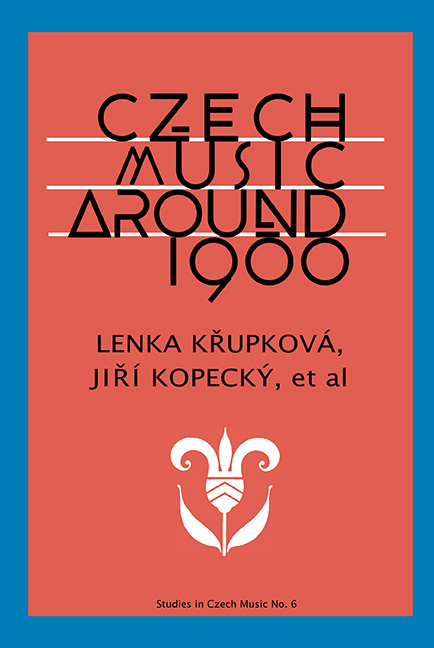Book contents
- Frontmatter
- Table of Contents
- Introductory Remarks on the Conception of This Book
- Flowers in the Graveyard, Tombstones in the Garden
- The “Other World” of Music at the Turn of the Century
- In the Footsteps of Tradition: The Spirit of Romanticism
- Czech Music at the Heart of European Music round 1900
- Novák as an Axial Figure in Czech Music
- Novák's Reception Abroad
- Josef Suk, Dvořák's Favorite Pupil
- Fibich's Path to Success in Prague's National Theater
- Tchaikovsky, Charpentier and the Formation of Janáček's Mature Operatic Style
- Josef Bohuslav Foerster's Lyrical Opera Eva and the Tradition of the French Drama lyrique
- Otakar Ostrčil and Mahler's Influence in Prague
- Folk Culture as an Outward Source of Artistic Inspiration: Vítězslav Novák the Tourist
- The Clash with Compositional Issues of European Music
- Index
- List of Illustrations
- About the Authors
- List of Sources Cited
Otakar Ostrčil and Mahler's Influence in Prague
from Czech Music at the Heart of European Music round 1900
- Frontmatter
- Table of Contents
- Introductory Remarks on the Conception of This Book
- Flowers in the Graveyard, Tombstones in the Garden
- The “Other World” of Music at the Turn of the Century
- In the Footsteps of Tradition: The Spirit of Romanticism
- Czech Music at the Heart of European Music round 1900
- Novák as an Axial Figure in Czech Music
- Novák's Reception Abroad
- Josef Suk, Dvořák's Favorite Pupil
- Fibich's Path to Success in Prague's National Theater
- Tchaikovsky, Charpentier and the Formation of Janáček's Mature Operatic Style
- Josef Bohuslav Foerster's Lyrical Opera Eva and the Tradition of the French Drama lyrique
- Otakar Ostrčil and Mahler's Influence in Prague
- Folk Culture as an Outward Source of Artistic Inspiration: Vítězslav Novák the Tourist
- The Clash with Compositional Issues of European Music
- Index
- List of Illustrations
- About the Authors
- List of Sources Cited
Summary
TO WHOM DID THE FUTURE BELONG?
Otakar Ostrčil (25 February 1879 - 20 August 1935) was one of the figures in Czech musical life who acknowledged Bedřich Smetana's position in Czech music as undisputed, and who knew both Antonín Dvořák and Zdeněk Fibich as mature and remarkable composers. The deaths of Fibich in 1900 and Dvořák in 1904, perhaps too early and too unexpected, created space in the Czech musical “heavens” for the young generation, confronting them with numerous tasks: besides their own work as composers, they had to safeguard the legacy of their predecessors, to perfectly master the art of composing, to succeed abroad, and also to become top performers and organizers of musical life. Their fates were also affected by the unexpected vigor with which Otakar Hostinský's pupils dominated official discourse. The two founders of Czech musicology, Zdeněk Nejedlý and Vladimír Helfert, were well aware of the power of both spoken and written words; the escalation of the so-called “Dvořák battles” before the First World War was one of their more doubtful achievements. Thankfully, after he had settled in Brno, Helfert reassessed his earlier opinions; he was able to recognize Josef Suk's and especially Leoš Janáček's qualities. On the other hand, Nejedlý remained stubbornly determined: even in the new setting of an independent Czechoslovakia, he was unable to break away from his superficial judgments, making personal preferences and biases part of his music criticism.
The life paths of the musicians who emerged following the deaths of the founding troika (Smetana, Dvořák and Fibich) are in several ways almost too obviously similar: they boldly came to the forefront around 1900, they wrote a number of high-quality compositions before the First World War, and they did valuable work as performers, critics and teachers. After the war, they were overwhelmed by their work for important national institutions. This distracted them from further composing and sometimes quickened their retirement, or made them unable to build on their earlier achievements. After 1918, Josef Suk taught composition at the conservatory in Prague, gradually and voluntarily withdrawing from public sight. He eventually left the Czech capital for the provincial town of Benešov and composed only small piano pieces. Oskar Nedbal assumed the leadership of Bratislava's main theater, but proved unable to ensure its financial stability.
- Type
- Chapter
- Information
- Czech Music around 1900 , pp. 207 - 224Publisher: Boydell & BrewerPrint publication year: 2017



